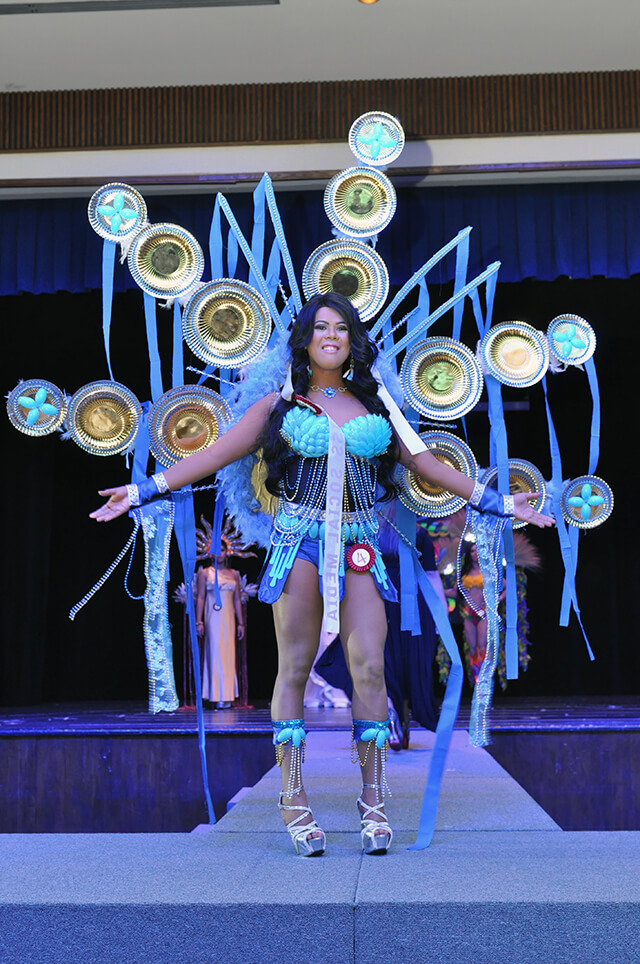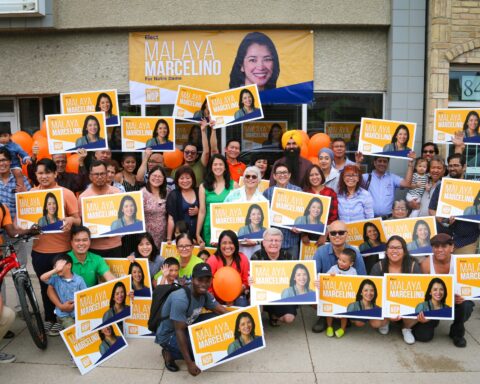Joseph Dadua couldn’t muster up the courage to try on a bikini at a women’s lingerie store in Montreal.
It took two of his fellow gay friends to encourage him to go to the dressing room of La Vie en Rose.
“It was an unforgettable experience,” the 24-year-old recalls, “everyone was accepting and open.”
Dadua says preparing for the Filipino community’s Miss Gay Montreal 2016 was a process that helped him embrace his effeminate side.
Miss Gay Montreal, held May 28, was the first of its kind for the Filipino community in Montreal.
It was a joint effort between Montreal’s largest Filipino group, FAMAS (Filipino Association of Montreal and Suburbs) and Pinoy LGBT.
Dadua and his three rival candidates all identify as “gay cross-dressers” he says.
Dadua and his three rival candidates all identify as “gay cross-dressers” . . .
For the competition, they chose a pretend country of origin and an existing female model’s name for the night – a tradition borrowed from gay beauty pageants in the Philippines. For example, Dadua (pictured below) wanted to be addressed as Leila Lopes and Miss Angola.
All the craze
Beauty pageants are a cultural frenzy in the Philippines. Last year, the country won two titles in international competitions for Miss Universe and Miss Earth, and two crowns in 2013 as well.
Blogger Raul Dancel aptly describes this obsession pointing out that the Philippines has a local beauty queen for each of its 40,000 small towns.
“There are a bevy of titles that will befuddle future anthropologists, including: That’s My Boy, Little Miss Philippines, Mr. Handsome, Little Miss Handsome, Miss Gay Philippines, Miss Supranational, Manhunt International, Mr. Marketplace and Super Mermaid,” he writes.
This is why when FAMAS approached the members of Pinoy LGBT to put together the event, the organization got on board immediately.
Adiva Estinozo, one of the main organizers of the pageant, identifies as a transgender and transsexual woman. She says she hid her gender identity and sexual orientation from her parents.
“I was scared of being isolated. That’s why I moved to the [gay] Village [in Montreal] on my own. I didn’t want to wait for the isolation to happen.”
“It helps parents to understand. It shows parents that their kids are having fun on stage.”
She understands firsthand how a contest can help build self-esteem. She won the Pista Sa Nayon singing contest in Montreal in 2002.
The grand prize was a trip to the Philippines and an appearance on a comedy TV show there, Home Along Da Riles. Upon returning to Montreal, Estinozo came out.
She says Miss Gay Montreal has also helped some of the candidates be their true selves.
“It helps parents to understand. It shows parents that their kids are having fun on stage,” Estinozo says.
Being seen and being seen equal
The LGBT community is quite visible in the Philippines, with celebrities like femme gay comedian, Vice Ganda, achieving top box office sales for his satirical films.
But for Mark Simbulan, co-founder of Pinoy LGBT and Estinozo’s co-host for the event, visibility does not translate to equality.
“The Philippines should be allowing gay marriage — not in terms of a religious basis, but on a human level.”
“The Philippines should be allowing gay marriage — not in terms of a religious basis, but on a human level. They should have human rights to love and be able to marry who they want to marry,” he says.
Simbulan says Pinoy LGBT is working on ways to promote gay marriage in the Philippines.
Asked what’s the main difference between a women’s pageant and a gay men’s one, Simbulan says, “not much, but ours is more fun.”
Indeed, the audience squealed with laughter at certain moments during the show. But candidates rode a fine line between mockery and entertainment.
Axl Hernandez, also known as Tyra Banks and Miss Venezuela for the night, used comedy to slam opponents.
“Not all horses belong in the stable,” Hernandez says in Tagalog upon grabbing the microphone. “Because you just saw one (the previous candidate) and there are two more.”
Another candidate who blurred the lines between ridicule and spectacle was Jerrieval Mark Garcia, a.k.a. Adriana Lima or Miss Brazil. During the talent portion, Garcia dressed in a black sequin cocktail dress performing a cabaret dance — then midway, he turned around, put on a baseball cap and tight boxers and fluttered his pelvis like a male stripper.
In the end, Dadua took home the crown.
To critics who think beauty pageants are objectifying and do not promote equality, he says, “Everyone is entitled to their own opinion. I’m not going to say anything against them. We need to focus on our own lives. If it makes us happy then why not. For me, they’re dedma.”
Dedma is a Taglish slang term mixing the English word ‘dead’ and Tagalog word ‘malisyoso’. In other words, he’s feigning their malice.
Editor’s Note: This copy has been updated to correct a mistake in the spelling of Adiva Estinozo’s name and the explanation of the word ‘dedma’. NCM regrets these errors.




